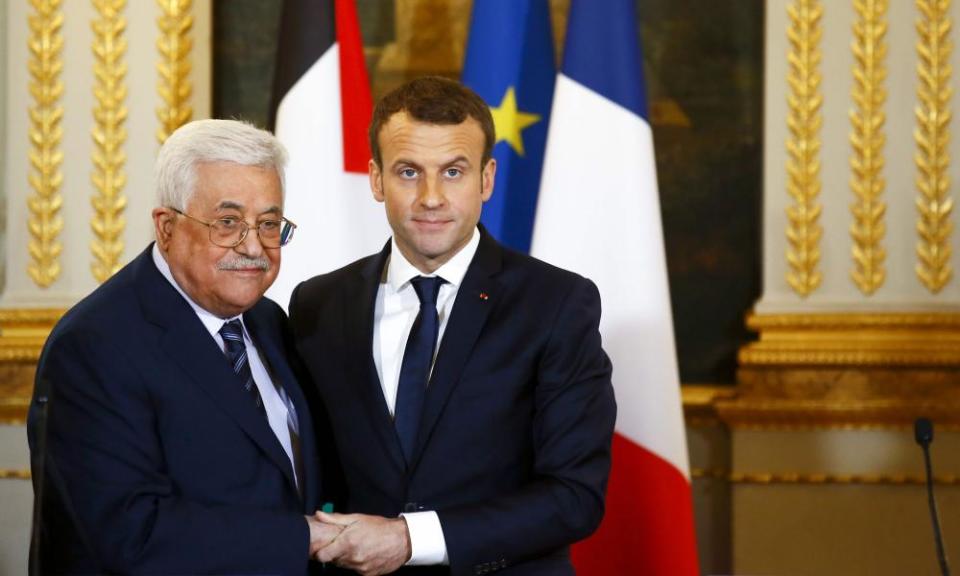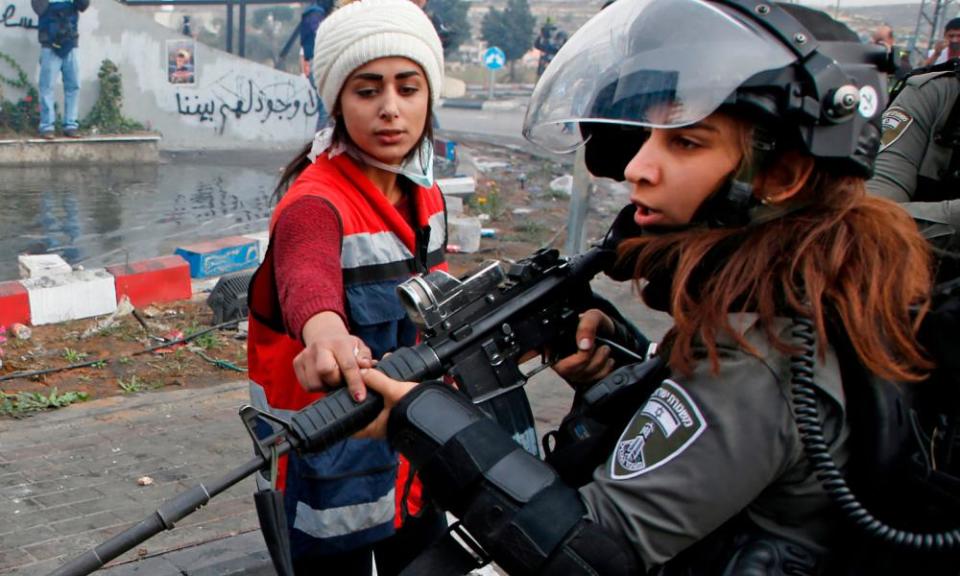Mahmoud Abbas calls on France to step up as he rejects US as peace broker
Palestinian president: ‘ The US has proven to be a dishonest mediator’
Emmanuel Macron receives Abbas in wake of US policy shift on Jerusalem

The Palestinian president, Mahmoud Abbas, has said that he would “no longer accept” any peace plan proposed by the United States, instead calling on France and Europe to play a stronger role in peace efforts between Israel and the Palestinians.
His comments on Friday came after the UN general assembly voted overwhelmingly to denounce Trump’s recognition of Jerusalem as Israel’s capital, largely ignoring Trump’s threats to cut off aid to any country that went against him.
One Palestinian man was killed and another four were wounded on Friday, during renewed protests over Trump’s Jerusalem announcement.
Washington’s unilateral change of policy on Jerusalem continues to reverberate in the Middle East and European diplomats are pessimistic about the Trump administration’s peace plan which is being prepared behind closed doors and will be presented to both sides in 2018.
Of all the issues at the heart of the enduring conflict between Israel and the Palestinians, none is as sensitive as the status of Jerusalem. The holy city has been at the centre of peace-making efforts for decades.
Seventy years ago, when the UN voted to partition Palestine into Jewish and Arab states, Jerusalem was defined as a separate entity under international supervision. In the war of 1948 it was divided, like Berlin in the cold war, into western and eastern sectors under Israeli and Jordanian control respectively. Nineteen years later, in June 1967, Israel captured the eastern side, expanded the city’s boundaries and annexed it – an act that was never recognised internationally.
Israel routinely describes the city, with its Jewish, Muslim and Christian holy places, as its “united and eternal” capital. For their part, the Palestinians say East Jerusalem must be the capital of a future independent Palestinian state. The unequivocal international view, accepted by all previous US administrations, is that the city’s status must be addressed in peace negotiations.
Recognising Jerusalem as Israel’s capital puts the US out of step with the rest of the world, and legitimises Israeli settlement-building in the east – considered illegal under international law.
“The United States has proven to be a dishonest mediator in the peace process and we will no longer accept any plan from it,” Abbas told a joint press conference with the French president, Emmanuel Macron.
Macron repeated his earlier condemnations of the US decision on Jerusalem, but he also ruled out recognising Palestine as a state unilaterally, which France has mooted previously.
“The Americans have marginalised themselves and I am trying to not do the same thing,” Macron said, conscious that any move to recognise Palestine would antagonise the Israelis.
On Thursday the 193-member general assembly adopted a resolution by 128 to nine with 35 abstentions that rejected the US decision on Jerusalem.
The defeat for the US came despite threats from Trump and the US ambassador, Nikki Haley.
Abbas hit out at efforts by the US to intimidate countries ahead of the vote.
“I hope that the others will learn the lesson and understand that you cannot impose solutions by using money and trying to buy off countries,” he added in Paris.
Abbas’s visit to Paris less than a fortnight after a trip here by the Israeli prime minister, Benjamin Netanyahu, has raised speculation about whether Macron might be tempted to mediate in the world’s most intractable conflict.
He and French diplomats have ruled out any fresh French initiative, insisting that the American effort must run its course first.

Vice-President Mike Pence postponed a trip he was due to make to the region this week, after Palestinian and Arab Christian leaders expressed reluctance to meet him.
The 40-year-old Macron has emerged as a dynamic international figure since his election in May but his team insists he is focused on reforming the European Union, avoiding instability in Lebanon, and anti-terror efforts in Syria and west Africa.
But Abbas, like Netanyahu before him, praised the young centrist at the Paris news conference, notable for the warmth of the exchanges and the relaxed body language.
“We have trust in you. We respect the efforts made by you and we count heavily on your efforts,” Abbas told him.
Macron replied that he had “committed myself very clearly to doing everything” to further the peace process and would visit the Palestinian territories in 2018 and “intensify” contacts between the French and Palestinian governments.
Palestinians have been clashing with Israeli troops since Trump’s Jerusalem announcement on 6 December. Nine Palestinians have been killed and dozens more wounded so far.
In Bethlehem on Friday, some Palestinian protesters held anti-Trump banners reading “Mr. Trump, it’s not your land to decide to whom it belongs, Jerusalem is ours and it belongs to us” and “Jerusalem is the capital of Palestine.”

